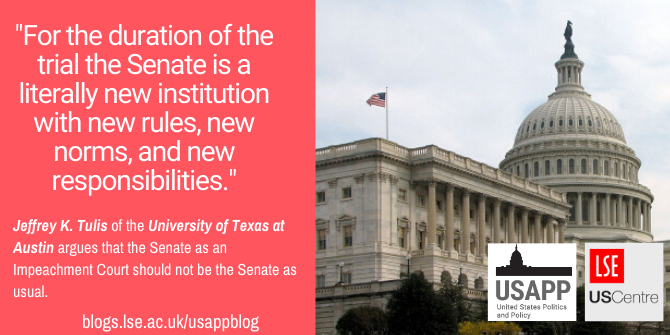 This week the US House of Representatives will likely vote to impeach President Trump. If and when this vote passes, then the US Senate will then be the venue for the trial which will determine whether the President should be removed from office or not. Jeffrey K. Tulis reminds us that in a Senate impeachment trial, that body effectively reconstitutes itself into a new institution – an impeachment court supposedly different from partisan politics as usual.
This week the US House of Representatives will likely vote to impeach President Trump. If and when this vote passes, then the US Senate will then be the venue for the trial which will determine whether the President should be removed from office or not. Jeffrey K. Tulis reminds us that in a Senate impeachment trial, that body effectively reconstitutes itself into a new institution – an impeachment court supposedly different from partisan politics as usual.
The polarization and political passion manifest in the politics of President Trump’s impeachment today was anticipated by the Constitution’s designers. This problem is a product of the kind of issues that prompt calls for impeachment—alleged abuses of office and violations of the public trust.
Indeed, in The Federalist, Number 65, Alexander Hamilton predicted that we would face exactly the kind of political discord we are now experiencing:
The prosecution [of alleged political crimes] will seldom fail to agitate the passions of the whole community, and to divide it into parties more or less friendly or inimical to the accused. In many cases it will connect itself with the pre-existing factions, and will enlist all their animosities, partialities, influence, and interest on one side or the other; and in such cases there will always be the greatest danger that the decision will be regulated by the comparative strength of the parties than by the real demonstrations of innocence or guilt.
The design problem for America’s constitutional architects was to invent an institution that could mitigate this problem.
Should the impeachment trial be conducted by the Supreme Court? Hamilton reported that the Court lacked the political fortitude to weather the storm that would attend any verdict: the Court’s legitimacy as a final tribunal for ordinary legal disputes would be undermined if it took on the issue of high politics as well. The Court might be able to mitigate partisanship, but it would risk its own legitimacy in doing so.
The Senate, on the other hand, was a more promising venue because it was a political body, but not as tightly tethered to factionalism and political passion as the House. It was designed to take a longer view and was therefore a promising site for such extraordinary trials. The idea was that rather than lowering the Supreme Court down to high politics, the Senate would be raised up.
To raise the Senate up to the demands of high politics, the Framers decided that the Senate would need to recompose itself into a new institution—an impeachment court.
This transformation was serious enough that senators would have to take a new oath of office.
According to Article I, section 3, clause 6 of the Constitution, senators, when sitting on a trial of impeachment, “shall be on Oath or Affirmation.” When they are elected to the Senate, all senators swear a general Oath to uphold the Constitution.
But the Oath taken in an impeachment trial is different. It is a juror’s oath and a judge’s oath—not a legislator’s oath. Rule XXV of the Senate Rules in Impeachment Trials provides the text: “I solemnly swear (or affirm) that in all things appertaining to the trial of ____, now pending, I will do impartial justice according to the Constitution and laws, so help me God.”

Credit: Scrumshus [Public domain]
For an impeachment trial of a president, the chief justice of the United States presides. He can be overruled by a majority vote of the other judges/jurors—which is to say the senators. But it is vital to remember that the Constitution asks them to remember that they are not sitting as senators, but now as judges and jurors.
So much so that for this brief period the senators are all equal. For the course of the trial the roles of Majority and Minority Leader, President Pro Tem, Committee Chairs, Whips, and so forth no longer exist. For the duration of the trial the Senate is a literally new institution with new rules, new norms, and new responsibilities.
In recent days Senator Mitch McConnell has been in conversation with the White House on how to game the trial, as if it were any other political item among the hundreds over which he has ridden herd. News reports indicate that McConnell is planning for a continuous whip of votes to determine the earliest possible time to end the trial, as if it were nothing different than debate over a budget bill.
This approach is patently anti-Constitutional and can only exacerbate the problem the Constitution was designed to mitigate. McConnell is diminishing the stature of the Senate, bringing a matter of high politics low. And it also is in literal violation of the oath McConnell and the other 99 senators will be required to take at the start of the trial.
The impeachment trial of President Trump requires dignity, fairness, impartiality, and seriousness of purpose in order to render a good verdict. But whatever the verdict, more is on trial than just the president.
Our political culture is on trial.
The impeachment of Donald Trump could be a rare moment of profound civic education, and of possible civic renewal.
Or it could enhance and accelerate the decay of democratic discourse in our time.
Please read our comments policy before commenting.
Note: This article gives the views of the authors, and not the position of USAPP – American Politics and Policy, nor the London School of Economics.
Shortened URL for this post: http://bit.ly/36Lp1WE
 Jeffrey K. Tulis – University of Texas at Austin
Jeffrey K. Tulis – University of Texas at Austin
Jeffrey K. Tulis is Professor of Government at The University of Texas at Austin, author of The Rhetorical Presidency, and co-author of Legacies of Losing in American Politics.







I detect bias in observing that Professor Tulis cites the Hamilton quote in Federalist 65 in support of criticism of the conduct of Republican Senators but not Democrat Congressmen when it appears to me that it applies to both, and the latter of those bodies has acted exactly as foreshadowed yet the formers prospective conduct is under examination and yet to have occurred. I would think a more appropriate message would be: Sadly and as foreshadowed by Hamilton the house has acted in a partisan manner, let us hope the Senate is able to function in a more responsible fashion and provide judgement on the accusations at hand based on their merits and not solely due to party affiliation.